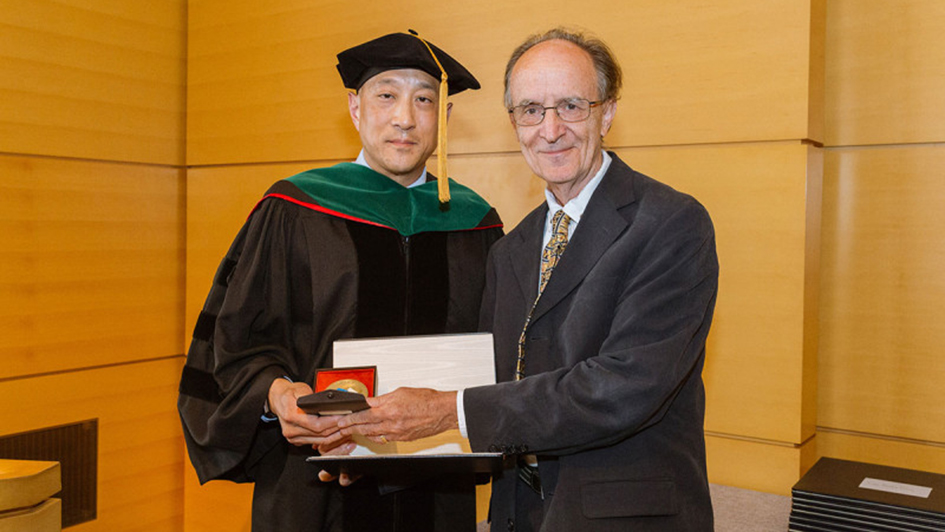
Image: Andrew Kung (left), Chair of the Department of Pediatrics at MSK, presents the ICR's Professor Mel Greaves (right) with the annual Society of Memorial Sloan Kettering Prize at the 2018 GSK commencement.
The ICR’s Professor Mel Greaves has been awarded a prestigious prize from the Memorial Sloan Kettering Cancer Center in New York for his ground-breaking research and expertise in childhood leukaemia.
The Society of Memorial Sloan Kettering Prize, established in 2016, is awarded annually to recognise an individual who has made significant contributions to the field of paediatric oncology.
The Society Prize was awarded to Professor Greaves in recognition of the pivotal role he has played in the understanding of genetic and environmental drivers in the development of childhood leukaemia.
Professor Greaves was honoured at the Annual MSK Academic Convocation where he was presented with a commemorative award, a cash prize and the opportunity to lecture at the Memorial Sloan Kettering Hospital.
The ICR's Professor Mel Greaves reveals how a major new analysis has shown for the first time the likely cause of most cases of childhood leukaemia and that the disease may be preventable.
Furthering our understanding of childhood leukaemia
Professor Greaves, who has been at the ICR since 1984, has spent his academic career working to understand childhood leukaemia and ways to prevent it, and recently published a landmark paper revealing for the first time the likely cause of most cases of the disease in children – following more than a century of controversy about its origins.
His research, which assessed the most comprehensive body of evidence ever collected on acute lymphoblastic leukaemia (ALL), concludes that the disease is caused through a two-step process of genetic mutation and exposure to infection that means it may be preventable with treatments to stimulate or 'prime' the immune system in infancy. The research received widespread coverage worldwide.
Earlier in his career, the work of Professor Mel Greaves and his team on the molecular genetics of childhood leukaemia uncovered the pre-natal origin of the disease in the womb, and shed light on its possible infectious causes.
‘A true luminary’
Andrew Kung, Chair of the Department of Pediatrics at MSK, described Professor Greaves as a “true luminary” and said: “This is a prize to honour a pioneer and visionary in paediatric oncology research.”
Professor Mel Greaves said: "I was delighted, surprised and honoured to receive the MSK award, not least because I am neither a clinician scientist nor an American.
"It’s such a privilege to work on children’s leukaemia. Progress in understanding the biology of leukaemia and its treatment has been hugely successful but there’s still more to do, not least, for me, seeing if we can prevent this cancer."
Worldwide recognition
In 2017, Professor Greaves was awarded with the prestigious Royal Society’s Royal Medal, and he was awarded in 2015 with the Cancer Research UK Lifetime Achievement in Cancer Research Prize.
He has eclectic interests in biology, cancer and medicine and is a strong supporter of the public understanding of science.
He is the author of the popular science book – 'Cancer. The Evolutionary Legacy' (Oxford University Press) 2013, and the ICR’s annual science writing prize is named after him for his role as one of the ICR's most eminent scientists, and skilled and enthusiastic communicators.
Watch: Professor Greaves talks about how a major new analysis has revealed for the first time the likely cause of most cases of childhood leukaemia and that the disease may be preventable: